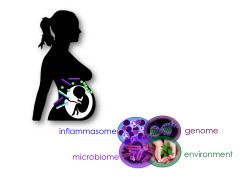 Dr. Kristin Connor, Department of Health Sciences
Dr. Kristin Connor, Department of Health Sciences
By Ariel Root
From the right combination of timing, interest, mentors, and luck, Kristin Connor found herself at the front of an emerging and exciting field of research regarding the influence of the early life nutritional environment on fetal growth and development, preterm birth, and later disease risk.
Connor came to Carleton University in September 2015 following six years of collaborative research at the Lunenfeld-Tanenbaum Research Institute (LTRI) at Mount Sinai Hospital in Toronto, Canada and the Liggins Institute in Auckland, New Zealand. Through her professional network and research experiences, Connor has been able to work “in different places around the world, with some of the best clinicians and scientists,” eventually finding herself back in Toronto, and now here, in Ottawa.
In addition to her international mentors, Connor identifies that her studies at the University of Toronto, under the supervision of John Challis, were particularly enriching and invaluable. During her studies with Challis, she was able to merge her personal and academic interests of pregnancy, development, and nutrition, as well as collaborate with researchers in New Zealand, Western Australia and the UK. Her exploration of early life nutritional environments has fuelled Connor’s scientific beliefs that understanding “early life environments and life histories [will] profoundly shape our [intergenerational] future” and “is critical [in] preventing and reducing the burden of disability and chronic disease.”
 Connor is researching barriers between the mother and fetus that respond to the environment, with particular interest in the maternal and offspring guts, the placenta, and the developing brain. One of her most personally inspiring studies was from her doctoral work, showing that maternal undernutrition reduced the enzyme barrier in the placenta that protects the fetus against high levels of maternal stress hormones in a sheep model. “These findings were important because …reduction in this protective barrier would make the fetus more vulnerable to maternal stress hormones, … [and] could negatively affect fetal development, particularly the brain,” and could lead to preterm birth.
Connor is researching barriers between the mother and fetus that respond to the environment, with particular interest in the maternal and offspring guts, the placenta, and the developing brain. One of her most personally inspiring studies was from her doctoral work, showing that maternal undernutrition reduced the enzyme barrier in the placenta that protects the fetus against high levels of maternal stress hormones in a sheep model. “These findings were important because …reduction in this protective barrier would make the fetus more vulnerable to maternal stress hormones, … [and] could negatively affect fetal development, particularly the brain,” and could lead to preterm birth.
Connor currently investigates the influences of early life nutrition and maternal metabolic health and their interactions with host genetics and microbial partners in modifying physiologic systems (particularly immune, metabolic and stress pathways). In collaboration with Stephen Lye from LTRI, Connor is exploring differences in microbiomes of mothers who are obese or have gestational diabetes, and how microbes might mediate pregnancy outcomes and set health trajectories of mothers and children. “ We know [that] the gut microbiome helps shape our ability to fight infection,” and impacts our metabolism, though minimal research has investigated the influence of the mother’s microbiome on early stages of fetal and infant growth and development. Her continued collaborations with LTRI will establish exciting opportunities between LTRI and Carleton University, enriching research at both institutions.
 One of the more challenging aspects of Connor’s work is the adaptation of a systems-based approach. Specifically, key barriers in pregnancy (including the gut and placenta) respond to environmental inputs, but host genetics and resident microbes will also impact functionality; therefore, “we cannot look at our genes, proteins, microbes, immune, endocrine and metabolic systems in isolation.” The necessary multi-disciplinary strategies “generate larger and larger datasets that require expertise on how to link and analyse them;” collaborators are pertinent to disentangle the data, and help to predict who is at risk for adverse pregnancy outcomes and on a path towards poor developmental and health across the lifecourse.
One of the more challenging aspects of Connor’s work is the adaptation of a systems-based approach. Specifically, key barriers in pregnancy (including the gut and placenta) respond to environmental inputs, but host genetics and resident microbes will also impact functionality; therefore, “we cannot look at our genes, proteins, microbes, immune, endocrine and metabolic systems in isolation.” The necessary multi-disciplinary strategies “generate larger and larger datasets that require expertise on how to link and analyse them;” collaborators are pertinent to disentangle the data, and help to predict who is at risk for adverse pregnancy outcomes and on a path towards poor developmental and health across the lifecourse.
Connor finds the interdisciplinary collaboration with clinicians, nurses, epidemiologists, biomedical scientists, and social scientists quite rewarding. Her interdisciplinary approach led to her initial interest in the CHAIM Centre. The CHAIM Centre “was on my radar when coming to Carleton because I was already looking at what health research was going on [here].” Connor believes that health awareness and knowledge translation is important to all Canadians, and the CHAIM Centre brings together a diverse group of people to share knowledge and expertise.
 “Doing what you’re interested in takes you on a track that might show you something else that you’re interested in, and it will turn into something that you love… and that’s what matters.” Her passion and excitement in her research field continue to fuel her drive for answers. “I’m personally guided by the principle that all individuals should have a healthy start to life no matter where they are born, and that health, well being, and the ability to contribute to society, are rights we all share.”
“Doing what you’re interested in takes you on a track that might show you something else that you’re interested in, and it will turn into something that you love… and that’s what matters.” Her passion and excitement in her research field continue to fuel her drive for answers. “I’m personally guided by the principle that all individuals should have a healthy start to life no matter where they are born, and that health, well being, and the ability to contribute to society, are rights we all share.”
Here for Kristin Connor’s contact information.
Photos by Athena Root